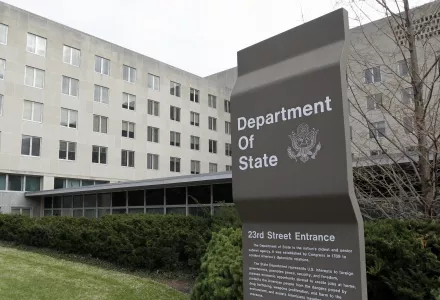International Security is America's leading peer-reviewed journal of security affairs.

This policy brief is based on “Why American Grand Strategy Has Not Changed: Power, Habit, and the U.S. Foreign Policy Establishment,” which appears in the spring 2018 issue of International Security.
Bottom Lines
-
Maintaining U.S. Grand Strategy. For decades, the United States has conducted a grand strategy of “primacy,” seeking to maintain unrivaled international hegemony. Even though this strategy brings unsustainable costs, generates avoidable security problems, and leaves the United States overstretched, Washington is averse to changing it.
-
Perpetuating Habitual Ideas. Since at least the 1960s, an influential and cohesive class of foreign policy experts—described by former Deputy National Security Adviser Benjamin Rhodes as the “Blob”—has dominated and defined discussion of U.S. national security strategy and made it hard even to consider revising grand strategy. By preventing government from reevaluating the fundamentals of U.S. statecraft, the Blob will likely accelerate the relative decline of U.S. power.
-
Checking Groupthink. Despite the constraining power of the Blob, changing U.S. grand strategy is possible. Such change would, however, have two requirements: catastrophes grave enough to disconfirm the assumptions underpinning that strategy and a president willing to bear the political costs of overhauling it.
Political scientists and historians continue to debate the sources of U.S. grand strategy. Some emphasize the importance of the United States’ material capabilities and large share of relative power; others point to the significance of ideas in shaping policymakers’ choices. Both accounts are incomplete. Two case studies—the first eighteen months of the presidency of Donald Trump and the presidency of Bill Clinton—demonstrate that the United States persists with a strategy of primacy because it has become a habit—an axiomatic, sacrosanct belief system that the American foreign policy establishment perpetuates.
Maintaining U.S. Grand Strategy
For six decades, the United States has practiced a grand strategy of primacy that contains four elements: military preponderance, containment and reassurance of allies, prevention of nuclear proliferation, and economic openness on American terms. Today, the United States faces mounting and unsustainable financial obligations; it has fought several disappointing wars; and its security commitments are multiplying. The world is becoming increasingly competitive and multipolar, putting the country on a collision course with China, Iran, North Korea, and Russia. As the security environment abroad deteriorates, the United States is politically polarized at home. Yet, at a time when the country needs to reevaluate its power and foreign commitments to bring them into balance, debate about U.S. grand strategy has ossified. Government officials and commentators disagree about how best to pursue primacy—whether or to what extent to apply sanctions or force against adversaries, or how much to defer to international institutions—not about whether to pursue it.
U.S. policymakers’ confidence in the United States’ massive power advantage and its ability to maintain primacy make U.S. grand strategy resilient to shocks. These policymakers are predisposed to interpret disasters—such as the terrorist attacks of September 11, 2001, or the global financial crisis of 2008—not as proof of a failing strategy, but as evidence that the United States should increase its dominance.
Even under the turbulent presidency of Donald Trump, the United States maintains a strategy of primacy. It strives to preserve military preponderance through a deficit-financed buildup; bolsters allies to strengthen its dominant power position in key regions such as East Asia, Eastern Europe, and the Persian Gulf; and seeks to prevent or reverse nuclear proliferation even at the risk of war. As a presidential candidate, Trump threatened to shred alliances, wind up nation-building wars, and tolerate nuclear proliferation. Yet so far, his administration has mostly maintained a traditional foreign policy in deeds, if not words. Primacy, it seems, is locked in.
Several grand-strategic choices are available to the United States short of reducing its foreign military presence and security commitments. Among these are power-sharing with other major states, offshore balancing, and shifting burdens to allies or clients. Yet despite increasing pressure and incentives to review its grand strategy, the United States remains averse to doing so. Why?
Perpetuating Habitual Ideas
Some U.S. officials have claimed that a foreign policy establishment circumscribes American statecraft. President Barack Obama’s deputy national security adviser, Benjamin Rhodes, characterized the foreign policy establishment as the “Blob,” predisposed to the frequent use of military force and incessantly worrying about the “collapse of the American security order.” Similarly, President Trump’s former deputy assistant for strategic communications at the National Security Council, Michael Anton, described it as a “priesthood,” keeper of the myths that underpin U.S. hegemony. Other insiders agree: former Director of the Policy Planning Staff Richard Haass spoke of an “informal shadow foreign affairs establishment.” Former Assistant Secretary of Defense for International Security Affairs Derek Chollet identified an “ecosystem” in Washington that encourages arguments for activism and penalizes those for restraint. Former Assistant Secretary of State Leslie Gelb remarked on “the disposition and incentives to support wars to retain political and professional credibility.” And Michael Mandelbaum, former foreign policy adviser to President Bill Clinton, reported that there is a policy “ballpark” that imposes boundaries on discussion.
The Blob emerged from the United States’ precipitate rise in World War II, when the U.S. government turned to security experts to guide its mobilization and projection of power. These experts helped create the sinews of U.S. primacy—alliances, a globe-girdling military presence, U.S.-friendly markets and institutions, and the dollar’s status as the global reserve currency. Their successors enjoy privileged access to power through a revolving door between public and private institutions, taking positions in think tanks, universities, foundations, corporate boards, and government. Today, this coterie is more socially diverse, but remains ideologically like-minded. Its members are internationalists, who regard the United States’ hegemonic leadership as axiomatically good for the United States and the world. They delegitimize alternatives to primacy as alien, foolish, and isolationist. Through their status and hard-won expertise in government, their domination of foreign policy commentary, and the reinforcing demands of U.S. allies, they have institutionalized primacy as the only viable U.S. posture.
The advantages of the foreign policy establishment pose a practical staffing dilemma, even to presidents inclined to introduce change. Appointing experienced officials to key positions installs defenders of the status quo. Yet to appoint untutored outsiders would risk ineptitude, and to mix the two groups might create incoherence. Even the unorthodox President Trump is drawn to rely on experienced policymakers and analysts who seek to perpetuate U.S. primacy. As Trump’s former strategist Steve Bannon noted after the 2016 presidential election, the pool of attractive candidates for appointment is restricted: “When you take out all the never-Trump guys…and all the neocons who got us in all these wars…it’s not a deep bench.”
Consider, too, the case of President Bill Clinton. As a candidate, Clinton promised change, and he won the presidency during the sudden shock of the Soviet Union’s collapse. The disappearance of major military threats to the United States spurred calls to relax U.S. commitments abroad and invest the spoils of the peace dividend at home. Yet, under the influence of authoritative advisers and the habitual perspective of the foreign policy class, the Clinton administration quickly defaulted to primacy. Privately, Clinton was skeptical about whether grand strategy was even possible, showing greater interest in the mechanics of domestic policy. In that vacuum, established ideas of U.S. leadership prevailed. The Clinton administration maintained a level of military power well beyond what the United States needed to deter aggression or defend itself; decided to preserve NATO and enlarge it after only a perfunctory debate; used force more often than most presidential administrations since that of Harry Truman; pursued free-trade agreements on U.S. terms; assisted the “shock therapy” of rapid economic liberalization in post-Soviet Russia; and confronted China over Taiwan.
Checking Groupthink
U.S. grand strategy can change, but doing so would require a shock (or shocks) large enough to disconfirm the current strategy, as well as a president sufficiently committed to absorbing the political costs of abandoning primacy. So far, Trump has not met that test.
To break the habit of pursuing primacy, the U.S. government should take the following steps. First, to scrutinize fundamental decisions regarding grand strategy, it should institutionalize an adversarial review process. This process would require mechanisms such as “red teaming”—using simulations, vulnerability probes, and alternative analyses to better determine U.S. interests and capabilities. Second, to evaluate existing assumptions, the Office of Net Assessment (the Pentagon’s institution for providing internal assessments) should be given an expanded brief and explicitly formulate a “shadow” national security strategy, played out through scenarios built around competing grand strategies. Unfortunately, the only chance of such measures being implemented lies in the minds of policymakers and the Blob itself. The high price of America’s current grand strategy may be worth paying, but it warrants rigorous review. Given what is at stake, citizens are entitled to nothing less.
Related Resources
Benjamin H. Friedman and Justin Logan, “Why Washington Doesn’t Debate Grand Strategy,” Strategic Studies Quarterly, Vol. 10, No. 4 (Winter 2016), pp. 14–45.
Ted Hopf, “The Logic of Habit in International Relations,” European Journal of International Relations, Vol. 16, No. 4 (June 2010), pp. 539–561, doi:10.1177/1354066110363502.
Lawrence R. Jacobs and Benjamin I. Page, “Who Influences U.S. Foreign Policy?” American Political Science Review, Vol. 99, No. 1 (February 2005), pp. 107–123, doi:10.1017/S000305540505152X.
Barry R. Posen, Restraint: A New Foundation for U.S. Grand Strategy (Ithaca, N.Y.: Cornell University Press, 2014).
International Security is America’s leading peer-reviewed journal of security affairs. It provides sophisticated analyses of contemporary, theoretical, and historical security issues.
International Security is edited at Harvard Kennedy School’s Belfer Center for Science and International Affairs and is published by The MIT Press.
For more information about this publication, please contact the International Security publications coordinator at 617-495-1914.
Statements and views expressed in this policy brief are solely those of the author and do not imply endorsement by Harvard University, the Harvard Kennedy School, or the Belfer Center for Science and International Affairs.
Porter, Patrick. “How the U.S. Foreign Policy Establishment Constrains American Grand Strategy.” June 8, 2018



